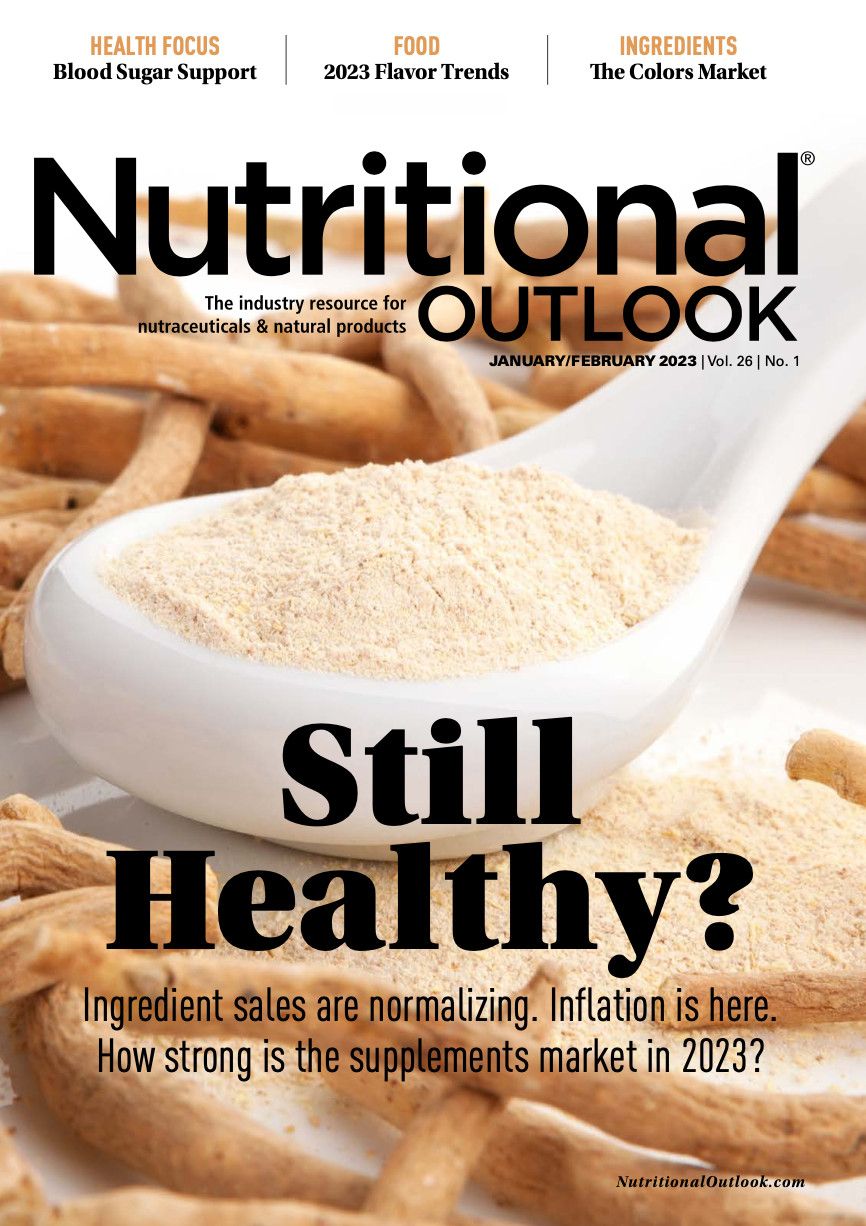2023 Nutraceutical and Natural Product Industry Outlook: Insights from Nutritional Outlook’s Editorial Advisory Board
Nutritional Outlook’s Editorial Advisory Board shares its predictions and tips for success in 2023.
Nutritional Outlook’s Editorial Advisory Board members highlight trends and challenges for the nutraceutical, natural product, and health and wellness industries in 2023—plus their tips for success.
What major market, industry, and/or consumer trends do you expect to see in 2023?
Scott Dicker
Senior Market Insights Analyst
SPINS
Scott Dicker

The first major trend that I am predicting for 2023 is a continuation of one of the largest growth categories of the past two years, active nutrition. All the signs are there for continued growth: expanding demographics that include older generations and women, larger distribution in mass market, and the evolving consumer demand to incorporate beyond sport performance. This includes mental performance and the continued growth of gaming-related products.
While there are many new and exciting ingredients in active nutrition, don’t be surprised to see an established king of sports supplements find accelerated growth. I’m talking about creatine. I see a similar situation to what we saw with ashwagandha over the past three years: a long-established ingredient gets new life, taking it to never-before-seen heights. With more and more research coming out on the benefits of creatine beyond muscle growth in areas like cognition and muscle-loss prevention, I expect creatine to have massive gains over the next few years, with an acceleration starting in 2023. I think a similar story, albeit on a much smaller scale, will be with hydroxymethylbutyrate (HMB).
Beyond active nutrition, I think we are due for renewed growth in joint- and bone-support products as new pandemic supplement consumers make their rounds learning about new categories. As active nutrition was the top growth category the past few years, there is undoubtedly an increased audience searching for joint support.
Joseph Dowling
CEO
CV Sciences
Joseph Dowling

The marijuana and cannabidiol (CBD) industries continue to grow: consumer interest is still at an all-time high, and many individuals continue to search for alternative health and wellness products to replace Western medicine. CV Sciences remains bullish on the future of the plant's potential. President Biden recently signed into law the Medical Marijuana and Cannabidiol Research Expansion Act promising legislation aimed at providing federal support to facilitate research on cannabis and its potential health benefits. The increased research investment, combined with sustained customer interest, will lead to significant industry growth. We expect to learn more about how different cannabinoids can be used to treat specific conditions, and are eager to see how the medical community will leverage this new knowledge to improve the overall health and well-being of our society. As the manufacturer of our +PlusCBD consumer brand, we will continue to leverage the latest scientific research to formulate our products so consumers can continue to address their specific need states, including sleep, anxiety, and pain.
John R. Endres, ND
Chief Science Officer
AIBMR Life Sciences
John R. Endres, ND

It seems that hemp products, not necessarily CBD alone, will continue to maintain high interest as ingredients for food, cosmetic, and dietary supplement use. Probiotics have been on fire and are likely to remain hot into 2023. Lastly, supporting the immune system will continue to be important to consumers as COVID-19 variants continue to emerge.
David Foreman, RPh
Founder and President
Herbal Pharmacist
David Foreman, RPh

2023 offers many opportunities for success. While the industry seems to be suffering from a hangover at the end of 2022 due to COVID-19, economic challenges, the Ukraine-Russia war, China shutdowns, and too many other events to list here, there are some key areas I see for growth. Factoring in the list from the previous sentence, I believe that all things mental wellness will continue to be hot moving forward. The stress of everyday life has had a profound impact on most people throughout the world. Companies that wish to take mental wellness to a new level will sell therapeutically formulated products and incorporate other support materials—such as apps, programs, etc.—to support the consumer in their quest to achieve optimal mental wellness.
Kimberly Kawa, BSc
Wellness Product Specialist
The Movitz Group
Kimberly Kawa, BSc

Age-positioning, health focus, and form in dietary supplements lead my new-year trend predictions. From an age perspective, theories on underchallenged immune systems in children following the lengthy time of mask wearing may lead caregivers to consider extra support from multiple wellness angles. On my radar are kid-specific probiotic strains to boost immunity that target ear, nose, throat, and tonsils, as well as botanical biofilm busters for microbial balance.
According to SPINS data on the U.S. supplements market, the following child-positioned categories report strong gains in total revenue and unit growth year-over-year*: cold-and-flu, immune health (revenue up 18.9% to $238 million), digestive health (up 12.6% to $69.7 million), and mood support (up $34.4% to $2.0 million). The top-5 functional ingredients by total dollar sales for children's cold/flu/immune and digestive health are homeopathic formulas, probiotics, elderberry, ivy leaf, and vitamin C. Since mood support is a niche segment for children’s supplements, it makes sense to call out the top-5 functional ingredients separately: L-theanine, homeopathic formulas, magnesium, flower essences (emotional homeopathy), and reishi (medicinal mushroom). We’ll likely see more assortment and growth in these segments and in formulas that address multiple conditions (e.g., immune and sleep). Regardless of age, I feel supplement formulas with dual primary health focuses will gain traction. Think synergistic functional ingredient combinations marketed for cognition & digestion, hydration & immunity, and mood & sleep.
Considering form, gummies have taken hold in the past several years, but I think we’ll see more brands explore soft chews. I’d be on the lookout for innovative formulas with no added refined sugars (e.g., Dole’s new The Secret Nature of Fruit line), as well as supplements with low-/no-calorie natural sweetener combinations such as allulose, monk fruit, and stevia. Perhaps this year will inspire sugar-mindful, kid-positioned soft chews or chewable tablets targeting digestion, immunity, mood, or sleep. Maybe we’ll even spot the use of sustainable superfood ingredients, like a bromelain and papain supplement made from upcycled pineapple and papaya.
*Source: SPINS cross-channel data in brick-and-mortar (Natural Channel + Conventional Multi-Outlet; powered by IRI) for the 52 weeks ending December 4, 2022.
Douglas “Duffy” MacKay, ND
Senior Vice President, Dietary Supplements
Consumer Healthcare Products Association
Douglas “Duffy” MacKay, ND

The past three years have reinforced that self-care—taking an active role in personal and family health—has tremendous value. The doctor is no longer the first and only place to go for all things health-related. Consumers are taking steps for prevention and wellness, like healthy eating, active lifestyle, health monitoring, supplementation, oral care, sleep support, handwashing and hygiene, and other personal healthcare practices. I predict that, in particular, consumer interest in tracking and acting on personal health data is going to continue to drive innovative self-care products. Technologies like digital apps and devices (like smart toothbrushes that inform you where you miss when you brush) are going to influence innovations in other categories like food and dietary supplements.
George Paraskevakos, MBA
Executive Director
International Probiotics Association
George Paraskevakos, MBA

I recently penned an article around the winds of change and how we are witnessing a “biotic” revolution. All things related to the microbiome and derived from microbes have captured the attention of industry, consumers, and healthcare providers alike. The application of bacteria has been around for thousands of years, and this accelerated adoption of understanding of this interplay between us and our resident microbes can have a direct involvement in our (human) well-being. Microbes and health will continue to make headlines in the coming years. Specific trends include how certain microbial communities will utilize various fermentation processes—which is most probably the world’s oldest and venerable biotech process—and create ingredients for use within the biotic space, such as postbiotics, para-probiotics, novel probiotics, and all other things biotic. Many of these ingredients will have specific and unique applications, and we are starting to hear about their uses, such as in brain-gut and stress applications, cholesterol support, specific and acute gastrointestinal-related issues, women’s health, infant health, and even skin conditions.
Irfan Qureshi, ND
Vice President, Product Development and Quality Assurance
Healthy Directions
Irfan Qureshi, ND

After what felt like a prolonged period between 2020 and mid-2022 when innovation and new research was brought to a screeching halt, things are looking up on the innovation and creativity front. While new developments on the ingredient front are progressing—an example would be development of upcycled materials previously considered waste products, or new areas of research for key vitamins such as menaquinone-7 (K2)—there is also a strong focus on improving nutrient delivery in terms of added convenience for consumers or enhancing bioavailability multiple ways.
Convenience is a crucial aspect that consumers are looking for as pill fatigue continues to grow. Gummies, liquids, soft chews, fruit chews, snack bars, stick packs, and other formats will continue to increase in appeal. The challenge for companies will be developing efficacious products using these formats as that is what will lead to consumer loyalty.
Companies also continue to innovate beyond ingredients by making their offerings more bioavailable and increasing utilization of nutrients by the body. Some of these developments include liposomes and other methods to enhance delivery of hard-to-absorb ingredients or to potentially reduce the effective dose. An additional development is increased offerings utilizing sustained- or time-release technologies.
Other promising trends in the space include an increasing interest in dietary supplements and natural products among younger demographics, including millennials and others, which portends sustained success for the industry, provided companies are able to appeal to this demographic as a key part of their messaging.
Harry B. Rice, PhD
Vice President, Regulatory and Scientific Affairs
Global Organization for EPA and DHA Omega-3s (GOED)
Harry B. Rice, PhD

Inflation has reared its ugly head and is top of mind for consumers, particularly as it lingers. The good news is that supply chain issues appear to be easing, and the market continues to grow, albeit at a slower pace. While fish oil prices are at an all-time high due to last season’s low EPA and DHA yields, consumers of dietary supplements have been spared thus far. This is likely to change in the first or second quarter of 2023 when the price increases are inevitably passed along to consumers. When this happens, how many consumers exit the category may be tied to whether or not the United States falls into a recession. Curiously, from a historical perspective, recessions have been good for the self-care industry, including dietary supplements, so GOED is optimistic that should consumers leave the category, it will only be a short-term hiatus.
As far as condition-specific trends go, healthy aging has been picking up momentum, with no signs of slowing down. There is also pandemic-related concern about sleep, stress, and mood issues. Given omega-3s’ role in brain health, it makes sense that people are interested in exploring omega-3s for healthy aging as well as for mental health challenges. In fact, GOED recently gave a webinar on cognitive health that explored a variety of these topics.
Kantha Shelke, PhD, CFS
Principal, Corvus Blue LLC
Senior Lecturer, Food Safety Regulations, Johns Hopkins University
Kantha Shelke, PhD, CFS

Holistic health, prominent even before the pandemic, was further heightened during the pandemic with people around the world understanding the value of food and beverage as “medicine” and to help stay healthy. Nutraceuticals and functional foods offering benefits for immunity, cognitive health, mental health, overall health, and any way to enhance health are trending and will continue to do so. Even parents are switching to functional foods and beverages instead of Flintstones vitamins and other over-the-counter preparations to help boost their children’s health and well-being. People, even from the traditional mainstream establishments, will explore traditional medicine and seek options from Ayurveda, Chinese medicine, and integrative medicine.
Paula Simpson, BSc (Nutritional Sciences), RNCP, R. Herbalist
Founder
Nutribloom
Paula Simpson, BSc (Nutritional Sciences), RNCP, R. Herbalist

A Natural Complexion Is the New Makeup
Highlighted by Vogue in its top-9 beauty trends for 2023, healthy, balanced skin is the desired aesthetic for 2023. From a health perspective, we know the influence and systemic effects that a healthy body, good nutrition, and targeted supplementation can have on the skin. As more consumers strive to achieve balanced, luminous skin, they will be looking beyond topical interventions to help them achieve it. From the gut-skin connection to the mood-skin connection, there will be more emphasis on our “internal health” for healthy, luminous skin.
Skin Minimalism Movement Triggers Supplement Minimalism
Skin microbiome science, eco-consciousness, and green beauty trends, along with inflation, brought the “skin minimalist” trend in 2022. Consumers have become overwhelmed and more educated about the number of products they apply to their skin or about the supplements they ingest. Wellness-focused beauty brands in 2023 will focus on “quality” of ingredients over “quantity.” Formulations bringing credible, multifunctional, and less-complex products to market will win in 2023.
Beauty for All
From personalized needs in skin health and targeted conditions such as acne or psoriasis, to different stages in our life cycle, aesthetic-focused nutrition/nutricosmetic interventions will continue to emerge across many categories in 2023. This is why women’s intimate care and menopause are two areas that saw growth in 2022.
Sustainability, Biotech, and Fermented Beauty Tap into Clean Beauty
As eco-conscious and sustainable ingredients emerge thanks to advanced manufacturing capabilities such as fermentation, consumers continue to look beyond a product label to learn about how and where ingredients are manufactured. With growing concerns over “greenwashing,” transparency and manufacturing of ingredients will hold more value and consumer brand loyalty in 2023.
Science Wins, but How It Is Communicated Is Key
Oversimplified influencer marketing is losing momentum as consumers are seeking out “proof of concept” and credibility from wellness-focused beauty brands. Credible experts and clinical validation will win over in 2023 but only if communicated in a way that is practical and relatable for the targeted demographic. It’s easy to cite the findings of a clinical study, but is it relatable to your reader? Strategic content marketing that is credible, yet relevant, will win.
John E. Villafranco
Partner
Kelley Drye & Warren LLP
John E. Villafranco

Consumers will continue to take interest in purchasing products from brands that highlight their environmental, social, and governance (ESG) standards, including any positive environmental impact and sustainability efforts. Claims and certifications such as Fair Trade, organic, and non-GMO increasingly impact consumers’ purchasing decisions, and companies would need to assure consumers that the claims they promote are truthful and fully supported.
Lu Ann Williams
Global Insights Director
Innova Market Insights
Lu Ann Williams

Innova’s Top Ten Trends for 2023 define the key themes that shape consumer demands and industry trends over the coming year. Health and affordability are essential, a direct result of a global pandemic followed by worldwide concern over the cost of living. But we’ve also seen that personal values remain a strong driver, with health of the planet still the number-one global concern. So there will be a greater focus on maximizing nutritional value as a positive response to economic, personal health, and environmental concerns. Producers are innovating to achieve greater yields and wider uses for ingredients. In plant-based, we’re seeing a greater range of protein sources, which offers more choice while guarding against supply issues.
It’s also more important than ever to build a connection with consumers. Trust is vital, so messaging needs to be simple, clear, and based on an easily understood reality. Younger consumers are particularly used to interacting with brands, though the desire for trust and honesty runs across generations.
What will be the biggest challenges for nutraceutical and natural product companies in 2023?
Judy Blatman
Founder and President
Judy Blatman Communications LLC
Judy Blatman

For me, the buzzword is uncertainty. Quite simply, the world is getting wonkier. There will be no shortage of challenges for this industry, from the worldwide geopolitical situation to just-plain-old politics here in this country; from ongoing supply chain issues and lag times to a global economy that can’t seem to decide where it’s going to land in 2023; and from viruses that keep multiplying and morphing to stressed-out employees who are reevaluating their work location situations and work/family balance. None of this, however, is unique to dietary supplement and natural product companies. And one advantage—which should never be taken for granted—is that this industry has its foothold in consumer popularity. Consumers still recognize that good health is foundational to life, and the industry’s hope is that supplements will continue to be seen as “must-have” goods rather than discretionary products.
Scott Dicker: There are a few major market-wide challenges that are not specific to the supplement department but are nevertheless the biggest challenges. While I hope that we are past the worst of it, a slowing economy and high inflation are going to continue to make consumers reconsider their expensive purchases, which supplements usually fall into. Beyond consumers pulling back on spending, companies must compete with an increased focus on private brands from retailers. This is happening in all categories, and the quality of these private brands continues to be more aligned with changing consumer values. This poses a real long-term challenge to brands.
Joseph Dowling: Many challenges faced last year are persisting into the new year as the supply chain remains fragmented from the effects of the COVID-19 pandemic and as the industry is now impacted by inflation and a potential recession. Since most brands slowed down product innovation on all fronts during the pandemic, 2023 will be a year to play catch-up on previously missed opportunities.
John R. Endres: Getting regulatory status from FDA for CBD as a dietary supplement by providing the additional toxicological studies that investigate the endpoints that are a concern to the agency, such as reproductive health and pregnancy.
David Foreman: The biggest challenges in 2023 will likely be a carryover from 2022. Supply issues, staffing, and economic insecurity will play a massive role in the natural product market in 2023. However, companies that can be flexible and creative across the board will come out ahead.
Douglas “Duffy” MacKay: The global supply chain continues to be impacted in unpredictable ways by the geopolitical and economic landscape, climate change, and unprecedented consumer demand. Supplement executives outside of quality control may underestimate the challenges when you can’t source an ingredient, which can often be part of several multi-ingredient products. It is not as simple as finding another ingredient supplier. There is an extensive regulatory process to qualify a new supplier and perform testing to make sure the alternate ingredient meets specifications. These processes take time, cost money, and can cause chaos if not managed properly.
George Paraskevakos: As we have seen post-pandemic, and evident in the data reports compiled for IPA members, consumers want to avoid becoming ill and are on the lookout for products which will help them attain wellness. Some of the “high-on-the-radar-screen” products are probiotics. What is key for the probiotic industry, and for the all-natural health products industry, is educating about product benefits. Communicate to consumers in a readily available, easy-to-understand manner. Profile the benefits and derived mechanisms, and base these claims of well-being on scientifically justified research. For probiotics, make sure that probiotic labels follow the IPA Probiotic Labeling Guidelines and that counts of bacteria are labeled with expiry dating, storage conditions are well-defined, and all the probiotic organisms in the product are properly listed. Ensure that claims are tied to the strain-specific organisms and have a robust scientific foundation.
Irfan Qureshi: After more than two years of a pandemic and now followed by high inflation, and a potentially recessionary economy on the horizon, 2023 will be a challenging year for many companies in the supplement space. While the industry overall has been considered “recession-proof,” with many elderly supplement users on fixed incomes, companies are bound to see a decline in sales from this demographic over time. If the economy worsens or fails to recover during 2023, other demographics will also feel the pinch, and there could be serious repercussions related to this.
Further headwinds include the continued threat of COVID-19 (yes, we’re not out of the woods yet!) and other viruses specifically on the overall supply chain for components and ingredients. With China loosening its “Zero COVID” policy in favor of a more open economy, the threat of COVID looms large. We’re already seeing a significant increase in cases there, and further increases are inevitable. The threat of large-scale deaths from these cases, as well as the potential for new viral variants emerging from China, looms large for the global economy. As a large percentage of ingredients and components are sourced from China, this is a huge risk for natural product companies. This is the time to continue to hone strategies to stay ahead of supply chain challenges and crises and is certainly not the time to abandon practices that served companies well during the height of the pandemic.
Harry B. Rice: GOED is always on the lookout for anything that may impede our members’ ability to conduct business. To that end, there are a couple of issues that we’ve been monitoring and will continue to monitor into 2023.
The first issue surfaced in Q2 of 2022 when the National Oceanic and Atmospheric Administration’s (NOAA) Seafood Inspection Program (SIP) announced that it planned to suspend export certification of encapsulated fish oil for human consumption—not because of a safety concern but because of concern for the integrity of the seafood certification program. Should countries lose their faith in the United States’ ability to certify seafood products, it could mean an inability to sell seafood products to one or more countries, an issue that extends well beyond dietary supplements.
Fortunately, export certifications were never suspended, but the approval process and criteria to receive an export certificate was modified such that it did cause some hiccups. Many of the issues have been addressed, while others are well on their way to being resolved. Perhaps the silver lining is that all regional offices are now issuing export certificates for fish-oil-based composite products, which are products composed primarily of fish oil but which also contain a plant-based ingredient like olive oil. Until now, many companies hadn’t been able to receive an export certificate for these types of products.
When GOED last spoke to Steven Wilson, division chief of SIP, he was hoping to distribute further communication to stakeholders by the end of the calendar year [2022]. With any luck, such communication will have been distributed by the time you read this.
The second issue is one GOED reported on last year. It’s a rule from the United States National Marine Fisheries Service (NMFS) and the National Oceanic and Atmospheric Administration (NOAA) implementing a provision of the Marine Mammal Protection Act (MMPA) requiring any global fishery exporting products, including fish oil, to the United States to comply with rules to address injury and mortality of marine mammals. GOED had anticipated that after January 1, 2023, a fishery’s fish or fish products would be permitted to be imported into the United States only if the fishery had received a positive comparability finding; however, in October, a one-year extension was announced in the Federal Register. Because of the lack of transparency in the process, it remains unknown if countries have submitted the necessary information. Since GOED learned about this issue, we’ve been in close contact with NOAA to ask questions and share our members’ concerns. In fact, last February, a representative from NOAA presented during the GOED Exchange, which provided a fantastic opportunity for further clarification of the rule and allowed GOED members to ask any outstanding questions.
Kantha Shelke: Purity and safety will continue to challenge dietary supplements and natural products because of bad actors in the field. There is an opportunity for trade associations and educators to help people learn about the value and history of safe use of supplements and botanical preparations.
John E. Villafranco: Among the biggest challenges for dietary supplement and natural product companies will be navigating the constantly evolving regulatory space on the state as well as federal level to achieve compliance while meeting consumer demands. Companies have to sift through the conflicting state and federal laws, most notably in the hemp and CBD space, that have long created uncertainty for companies. State laws are constantly evolving to address the gaps in their laws, partly created by new forms of products on the market (like delta-8 THC). On the federal level, FDA will continue to be active in monitoring and issuing warnings to companies that sell supplements marketed as drugs with claims that the product is intended to cure, treat, mitigate, or prevent a disease.
The FTC will similarly continue to be active in monitoring, among other claims, disease and COVID claims on dietary supplements and natural products, and will look to companies to comply with its recently issued Health Products Compliance Guidance, which stretches the law in a number of ways. The Guidance attempts to redefine what constitutes competent and reliable scientific evidence in support of health claims, and will almost certainly be challenged in litigation.
Companies will need to build a strong compliance team that can navigate through these challenges and ensure product claims are fully supported in the face of enforcement action or lawsuit.
Lu Ann Williams: For dietary supplements, as with so many sectors, it is key to provide healthy options that work for stretched budgets. Price and trust are the big purchase drivers, so it is important to meet both these consumer needs. Clear, easy-to-understand health cues and product information allow products to stand up to scrutiny while allowing consumers to focus on what’s most important to them.
As for natural products, brands have to ask themselves whether “natural” is enough of a positive on its own to consumers, especially if it impacts price. Older consumers value the natural attribute more than younger ones, who are strongly attracted to novel flavors. Therefore, brands could consider positioning natural claims alongside other values. Another challenge is the use of new production technologies, which can sometimes be viewed as contradictory to claims of naturalness.
In 2023, what will be the key to success for those in the nutraceuticals and natural products industry?
Judy Blatman: Winning companies will need to be flexible, nimble, and ready to change on a dime in 2023. Expect curveballs that come at you like fastballs. (Yes, I know, that’s an oxymoron, but you’ll see…)
In my work as a freelance writer for Nutritional Outlook, it’s been gratifying to see a growing number of companies embracing a holistic approach to ingredients and products, taking the meaning of holistic to more inclusive levels, from product ideation to manufacturing and marketing. For example, many companies in the active sports nutrition category recognize that their products can appeal to more than one demographic, even as the end user will expect—and likely see—different benefits. And as consumers themselves are favoring a more holistic approach to wellness, supplement companies are embracing and proactively positioning the synergy of nutritional components with physical activity, healthy sleep habits, and stress avoidance/management.
I’m also watching companies that innovate with advances in technology, machine modernization, improved delivery methods, and products that provide consumers with better choices and better results. But in a year where we will surely need to see more kindness, innovative companies will also be seeking out new ways to energize and incentivize their employees, recognizing that like the industry they represent, that is not always a one-size-fits-all solution.
Overall, I’m betting on companies that wear their core values on their sleeves, like innovation, science, sustainability, and resilience.
Scott Dicker: The key to success is going to be innovation. Consumers will continue to pay for their own wellness as long as they can. It’s essentially the last thing to pull back on with spending. The opportunity is in making sure that you are meeting consumers with their ever-changing values. That means supporting sustainability measures and using both tried-and-true ingredients along with new, innovative ones. At all the trade shows in 2022, we saw a lot of innovative new ingredients in categories that are in high demand: branded ingredients that were studied specifically for gaming, a vegan collagen (not just a collagen booster), a variety of other energy and focus ingredients, and the expansion of precision fermentation in dairy-free whey. As the costs of whey protein continue to go up, along with the cost of animal agriculture in general, I think we are at the point where precision fermentation is going to be a major disruptor over the next few years, with the impact starting in 2023. This was a long way of saying that for brands to be successful in a year that will likely continue to bring more uncertainty around pricing and supply chain, brands cannot stop innovating if they want to be successful.
I think proving efficacy of your products, not just referencing studies on ingredients, is going to be the next phase of transparency. Consumers are becoming much more educated and are looking for specific doses and research behind combination formulas. Finally, make sure that your product content is easily available to interested consumers both in-store and online. Understand what attributes consumers are interested in for your category and make sure that you highlight those where you can. If it’s not on the label, make sure it’s still easy to search for and in your online content.
Joseph Dowling: Brand identity is the key factor to finding success in 2023 and beyond. According to the 2021 CRN Consumer Survey on Dietary Supplements, 80% of Americans are incorporating dietary supplements into their daily lives, and in order for a brand’s products to resonate with consumers’ needs, brand identity will be the key vehicle to generating interest and bringing consumers back to their local retailer or online shop to purchase the same products. Specifically, in the hemp-derived-CBD space, we witnessed thousands of bad actors jump on the CBD bandwagon. Most of these brands were unsuccessful because consumers quickly realized that the products were not backed by science, boasted unsubstantiated claims, and didn’t work as advertised. At CV Sciences, we pride ourselves on leaning into the science and ensuring that what we put on the label is in fact what the product can achieve, and we believe that is why consumers continue to resonate with our brand identity.
John R. Endres: As always, putting science behind the ingredients and products—safety (tox studies) and functionality (clinical investigations).
David Foreman: Innovation and sustainability will be strong movers in the market. Companies willing to "think outside the box” and engage consumer input and personalization will win big.
Douglas “Duffy” MacKay: Being flexible, creative, resilient, responsive, and prepared for the unexpected are becoming key strengths of successful companies and executives. Having robust supply chain management with insights into potential challenges can help avoid supply disruptions.
George Paraskevakos: Success in 2023 and beyond will rely on credibility, standards, and accountability. Companies in the industry must be clear and stand by their products using the proper standards and regulations in place to gain consumer trust. Examples of what we are doing at IPA in raising the bar and quality so that safe and beneficial products are reaching consumers can be emulated across the natural products industry.IPA has created both a regulatory manuscript summarizing probiotic regulations of 36 countries, and we also have created an IPA best-practices guideline for manufacturing probiotics. We are moving towards making these guidelines an addendum to the ANSI 455 public standard for GMP manufacturing of dietary supplements, considering the uniqueness of probiotics. And, through our technical committee work, IPA just completed an application to establish a liaison with an ISO working group to ensure probiotic enumeration standards are validated and ISO certified.
2023 raises opportunities for health and well-being, scientific research, and industry leadership for probiotics and supplements. By conducting ourselves responsibly, we will continue to build trust with all stakeholders and ensure our long-term sustainability.
Irfan Qureshi: Those companies that are able to understand where the economy and consumer sentiment are headed, specifically by being nimble and offering products that appeal to and meet consumer demand as well as the needs of newer demographics that are interested in natural products, will be set up for success in 2023. Companies need to take advantage of innovative ingredient technologies, explore unique delivery forms, and continue to formulate products that make a difference in people’s lives.
Furthermore, being able to effectively navigate the global headwinds related to supply chain challenges as well as a recessionary economy here in the U.S. are also key factors that need to be kept front and center. It would be wise to get ahead of these challenges before a potential worst-case scenario hits. Brands that are successful at doing so in 2023 will be the ones that come out stronger in 2024 and beyond.
The good news is that the global demand for natural products continues to increase, so it is incumbent that brands offer products that are effective and repay consumers’ trust in the industry.
Harry B. Rice: Consumer trust will drive success, regardless of the category. The most effective trust-building tool in a supplement company’s arsenal is its commitment to quality. To this end, all GOED members must adhere to the GOED Voluntary Monograph which has served as the omega-3 industry’s standard of quality since 2002. The standard was developed by the members of the Omega-3 Working Group at the Council for Responsible Nutrition, the predecessor to GOED, to help ensure that omega-3 oils reaching consumers are both safe and of high quality. The companies that participated in developing the monograph incorporated the strictest quality and purity standards from regulations around the world to ensure that any oil manufactured to the monograph standards can be sold around the world.
Kantha Shelke: Investing in educating the target audience will be one of the keys to success for those in the dietary supplement and natural products industry. Teach them with transparency and integrity to bond with consumers instead of bombarding them with propaganda and traditional marketing tactics. Earn their trust and thereby their loyalty by teaching them, and form a meaningful connection with your audience.
John E. Villafranco: The key to success for companies in the dietary supplement and natural products industry is building a strong team that can assess risks and help the company achieve compliance in the constantly evolving regulatory space. Investing in legal resources is worthwhile for companies looking to protect their brand and company’s longevity as well as to earn consumer trust.
Lu Ann Williams: Building relationships and extracting maximum value, in every sense of the word. Consumers respond to products and brands that share their values, so tell them about yourself. Use digital tools and social media to get your story across, but make sure that story is true to the consumer experience. Involve the public in the brand journey. Reveal what you are doing, why you are doing it, and what steps you still need to take. Honesty has a premium, and it is rewarded.
Also, don’t forget about added value. Consumers want to have it all, or at least as much as possible. Sometimes, one key benefit isn’t enough. Natural products can have health, environmental, and ethical positives. Don’t be shy in sharing them while at the same time being transparent about your ongoing efforts.



























